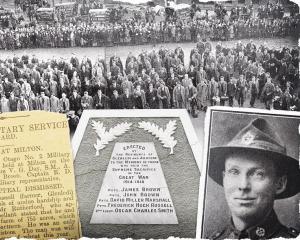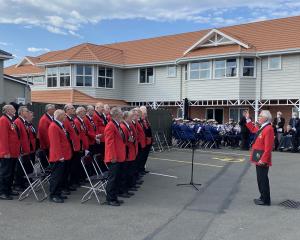For a country with a proud history of military involvement over 150 years, we do not know much about our veterans.
We do not know exactly how many there are - we stopped asking that after the 1971 census.
We give them war pensions and allowances based on a system which has remained largely unchanged since 1954.
Until now, we have not had a panel to specifically examine the impact of military service on veterans' health.
The system for measuring veterans' impairment is complicated and clumsy, and, some veterans say, applied inconsistently.
Service people - almost exclusively men - injured before the introduction of ACC in 1974 are financially disadvantaged.
A pre-1974 veteran on a 100% disablement pension receives $182.02 a week, while post-1974 veterans are paid 80% of their wages at the time they were injured.
More than 205,000 people served in World War 2, of whom 135,000 were posted overseas.
Of the estimated 35,000-40,000 who are still alive, only 9350 are receiving a war pension.
The 1954 War Pensions Act does not deal well with the types of injuries or disease post-WW2 veterans are likely to suffer.
It is no wonder it is time for an overhaul.
Former national RSA president John Campbell, of Dunedin, has worked tirelessly over the past eight years to persuade governments to take the nation's responsibilities to veterans more seriously.
The past five years have seen rapid advances, starting with a parliamentary health select committee investigation into health issues suffered by Vietnam veterans.
That resulted in a 2006 memorandum of understanding between the RSA and the Government on agreed health conditions and pension payments to those veterans.
The RSA has also intensified a campaign to encourage veterans, particularly WW2 veterans now in their mid-80s and older, to apply for war pensions and to help them with the form-filling and report-gathering that process requires.
The campaign is working.
Mr Campbell said while the number of WW2 veterans was steadily declining and was expected to drop by as many as 20,000 in the next decade, the number of applications for war pensions was increasing.
In 2007, it was announced the Law Commission would completely rewrite the War Pensions Act to make it simpler, more relevant and more streamlined.
The Law Commission said the rewrite should clarify exactly what health conditions were attributable to war service, thus reducing "unacceptable delays" in processing veterans' pension claims.
The most recent advance was the naming this month of the new expert panel on health.
The advances are supported by Dunedin RSA identity Fred Daniel.
A Vietnam veteran whose army career spanned 32 years, Mr Daniel is chief executive of the Montecillo War Veterans' Home and also one of a number of panellists around the country who make the initial assessments about the eligibility of veterans for disability pensions.
Every month, he considers 70-100 applications; every month is a test of his judgement.
"We have the responsibility of determining the [country's] burden of care for those veterans."
He believes while the present assessment and payment systems work reasonably well, they are definitely in need of an overhaul.
"New Zealand got its first war pension scheme in 1866 and this is only the fourth review since. That is quite extraordinary."
Mr Daniel is most unhappy about inadequate payments to veterans not covered by ACC.
He also believes the Government should automatically compensate veterans exposed to defoliants or radiation, regardless of whether or not they have become ill as a result of that exposure.
In a discussion document released last year, the Law Commission outlined two underpinning principles for the new Act:
• Veterans are entitled to all the benefits, allowances and assistance to which every other New Zealander is entitled.
• Veterans who have suffered as a result of being put in harm's way deserve to be recompensed over and above the entitlements of ordinary citizens.
Mr Campbell (70), a Vietnam veteran and the layman appointee on the new health panel, said the RSA wholeheartedly endorsed those principles.
In its response to the Law Commission, it proposed veterans over 65 receive a veterans' pension instead of superannuation.
Payment levels would be the superannuation rate plus a 10% margin and free health care.
For under-65s, it said the fairest payment would be a payment tied to ACC rates, over and above any other income the veteran had.
But Mr Campbell knows there is much hard work to come to flesh out the details of the new Act.
"It will be a delicate, sensitive and difficult process, just as it was for the memorandum of understanding."
The Law Commission
An independent, publicly funded, central advisory body which reviews, reforms and develops New Zealand legislation.
Membership: lawyer and former prime minister of New Zealand Sir Geoffrey Palmer (president); criminologist and former professor of law at Victoria University, Wellington, Dr Warren Young (deputy president); lawyer and academic Emeritus Prof John Burrows QC; lawyer and former chief parliamentary counsel George Tanner QC; lawyer and former Ministry of Justice chief legal counsel Val Sim.
Review timetable
• September 2007: Law Commission asked by Government to review the War Pensions Act, 1954.
• July 2008: Law Commission publishes a comprehensive issues and discussion paper.
• October-November 2008: consultation meetings held at RSAs throughout the country.
• November 2008: written submissions on the discussion paper close.
• 2009: Law Commission to produce final report on what should be contained in new war pensions legislation.
• 2009 or beyond: report tabled in Parliament; Bill introduced implementing some or all of the Law Commission's recommendations; Bill sent to select committee for consideration; further round of public consultation; Bill possibly amended; Bill enacted.












